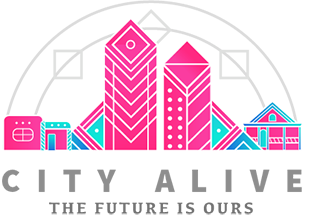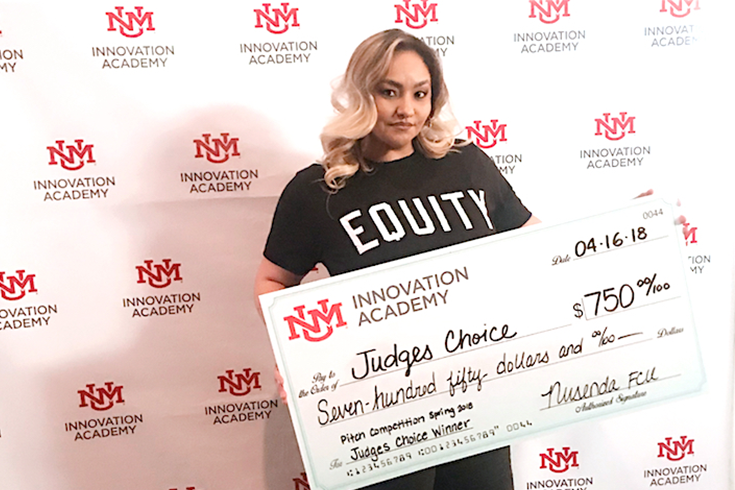“Nontraditional” Is the New Unstoppable: Mercedes Ortega-Kennedy is ABQ’s Next Big Thing
Mercedes Ortega-Kennedy is a model graduate. A model for any person who battles daily microaggressions and sexism, supports a family, is older than the traditional student—but doesn’t take no for an answer. During her time at UNM, Ortega-Kennedy won two pitch competitions, scaled her family business and took out intellectual property patents on her next idea. Considered a nontraditional student at 35 years old, Ortega-Kennedy graduated last December, and is already putting her biotech startup into full gear.
After breaking so many barriers, she shows no sign of fatigue. We asked what fuels her entrepreneurial spirit and how Albuquerque’s startup ecosystem is helping her realize her biggest ideas.
What inspired this entrepreneurial path for you?
I attribute my drive and hustle to my mother and grandmother. They were migrant farmworkers and neither finished formal schooling. Their resiliency was inspiring. My grandmother was a single mother, raising nine children. She provided for her family by any means necessary—that meant she was queen of the side hustle. When she wasn’t picking in the fields, she was cleaning houses, selling tortillas, working as a tailor and countless other odd jobs. Often this work was backbreaking and kept her from her family for long hours. I can remember helping her clean houses because we needed the money and Mom couldn’t afford daycare, so I cleaned with Grandma.
My grandma stressed the importance of my education and not depending on anyone but myself. She knew that an education was the one thing that no one could ever take away from me and would be my key to success.
What are the barriers you've faced as a Latina woman and/or nontraditional student?
I’m sure we don’t have enough time cover all of the challenges I have faced as a Latina and nontraditional student. In tech and research one of the most challenging obstacles has been owning my latinidad and getting others to respect it. In a male dominated field I’ve experienced being overly sexualized and having my knowledge and contributions diminished. But when gender discrimination rears its ugly head, I rear mine right back. That means having a “big hair don’t care” day, wearing red lipstick to a business meeting or rocking an outfit with bold colors. These are usually considered too audacious for a professional businesswoman—but why should they be? Natural hair is not unprofessional—it’s a sign that I’m proud of my heritage. Red lipstick makes me feel bold and empowered. And the bright colors of my dress channel my indigenous roots. I make no apologies. My latinidad might make other people uncomfortable, but it claims my space in a world where I know I belong and have earned a place.
What advice do you give to other young Latinas looking to forge an entrepreneurial path?
The best advice I can give to other Latinas is that you can and will make your own path. Often times that means making space where we are not wanted: walking into a room and being the only woman, the only person of color, the only queer person or the youngest. Have the confidence to command respect.
As a nontraditional student I have had to leave school many times. Life has gotten in the way when I had bills to pay and family obligations. Having been married and divorced, having survived domestic violence and a major motorcycle accident—I still I chose to put myself first. Last spring I decided to return to school, but this time to finish once and for all. I enrolled in UNM Liberal Arts and Integrative Studies and the Innovation Scholars program and took a full load. I did this while balancing a new promotion at work and working on my businesses. I told myself every day that I am sacrificing today for what is possible tomorrow. I wanted to not only survive, but to thrive. This past December I graduated, and it was the single greatest day of my life.
You helped your sister successfully scale her My Money My Future financial literacy program for the B2B sector. What need did this fill in the market?
Growing up Latina we had a cultural and historic trauma around money and finance. We didn’t talk about money or how to save and invest. The currently available financial products are not geared toward the Latinx population or people of color. Traditional financial literacy programs fail to provide content that is informed by and relevant to the unique cultural experience of millennials of color. Also the cost of professional financial advisement is often too cost prohibitive. My Money My Future is run by a team of people who have lived the experience first-hand. They are uniquely qualified to develop culturally-informed and relevant content for their peers. All of this content is accessible currently online, anytime, and at no cost to our users.
How was the Rainforest Pitch Competition formative for you as an entrepreneur?
My pitch competitions were great experiences. As part of my Create, Sell, Bank class with Bill Szaroletta at the UNM Innovation Academy, I was required to submit for the STC.UNM Rainforest Pitch Competition. In the class we learned about body language and communication, how to do market research, how to develop a brand and pitch deck and how to integrate technology into our business development. All of these skills prepared me for the pitch competition.
The pitch concept was creating a B2B platform for My Money My Future, marketed to Hispanic serving institutions and historically black colleges and universities. The platform would be branded for a client, monetized through licensing fees, and provide My Money My Future content to members at no cost.
When my pitch won Judge’s Choice, it felt like such an honor—more important even than a first prize. I felt it said a lot about my business idea to be considered legitimate and scalable by a panel of successful entrepreneurs.
How has the ABQ startup and entrepreneur community welcomed you? What makes this city unique for starting and scaling a business?
The response of the local ABQ startup and entrepreneur community has been incredible. Through the Innovation Academy at UNM Rainforest, STC.UNM and the Clinical and Translational Science Center at UNM Health Sciences Center, I have been able to connect with mentors who have helped me to grow as an entrepreneur as well as make connections to the business community. Rob Del Campo and Lisa Kutila have been amazing every step of the way, connecting me to resources to get my second pitch idea off the ground. With their help I was able to file for patent and trademark on my durable medical device, Tiny Touch, with the U.S. Patent and Trademark Office. It’s now in research and development.
I think Albuquerque is ideal for fostering a nascent business idea and scaling. People here are invested in growing our community for a brighter future. Our Albuquerque community is different from the landscape in Silicon Valley or Wall Street which can be an inhospitable place for women, people of color, or queer individuals. So if given an opportunity for grow and foster your new business in a place as diverse as ABQ, then I say do it!


